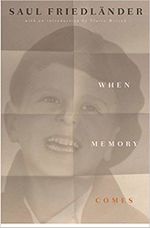File:1978 Friedländer.jpg
1978_Friedländer.jpg (328 × 500 pixels, file size: 25 KB, MIME type: image/jpeg)
{fr} Saul Friedländer. Quand vient le souvenir. Paris : Éditions du Seuil, 1978.
Translations
- {es} Cuando llega el recuerdo. 1978
- {en} When Memory Comes (New York : Farrar, Straus, Giroux, 1979).
- {de} Wenn die Erinnerung kommt. Stuttgart [Germany]: Deutsche Verlags-Anstalt, 1979.
- {it} A poco a poco il ricordo. Torino [Italy]: Einaudi, 1990
- Also translated into Hebrew (1980).
Abstract
"Memoirs of the Holocaust historian Saul Friedländer, born in 1932 in Prague. His parents fled with him to Paris in 1939, and in 1940 settled in the small town of Néris-les-Bains in the Allier. In 1942, after the Vel d'Hiv roundup, Friedländer's parents sent him to a Catholic boarding school in Montlucon, where, posing as a non-Jew, he was baptized with the parents' consent. After his conversion he began preparing for the Catholic priesthood. His parents were arrested while trying to flee to Switzerland, and were turned over to the French gendarmes. They were deported via Rivesaltes to Auschwitz, where they perished. Friedländer learned about the fate of his parents in 1946 and returned to Judaism. He immigrated to Palestine on the ship "Altalena" in 1948, which was bombarded by the newly constituted Israeli government and sank near the shores of Tel-Aviv."--
"A classic of Holocaust literature, the eloquent, acclaimed memoir of childhood by a Pulitzer-winning historian, now reissued with a new introduction by Claire Messud ... Four months before Hitler came to power, Saul Friedländer was born in Prague to a middle-class Jewish family. In 1939, seven-year-old Saul and his family were forced to flee to France, where they lived through the German Occupation, until his parents' ill-fated attempt to flee to Switzerland. They were able to hide their son in a Roman Catholic seminary before being sent to Auschwitz where they were killed. After an imposed religious conversion, young Saul began training for priesthood. The birth of Israel prompted his discovery of his Jewish past and his true identity ... Friedländer brings his story movingly to life, shifting between his Israeli present and his European past with grace and restraint. His keen eye spares nothing, not even himself, as he explores the ways in which the loss of his parents, his conversion to Catholicism, and his deep-seated Jewish roots combined to shape him into the man he is today. Friedländer's retrospective view of his journey of grief and self-discovery provides readers with a rare experience: a memoir of feeling with intellectual backbone, in equal measure tender and insightful."--Publisher description.
File history
Click on a date/time to view the file as it appeared at that time.
| Date/Time | Thumbnail | Dimensions | User | Comment | |
|---|---|---|---|---|---|
| current | 19:33, 17 March 2022 |  | 328 × 500 (25 KB) | Gabriele Boccaccini (talk | contribs) |
You cannot overwrite this file.
File usage
The following 2 pages use this file:




